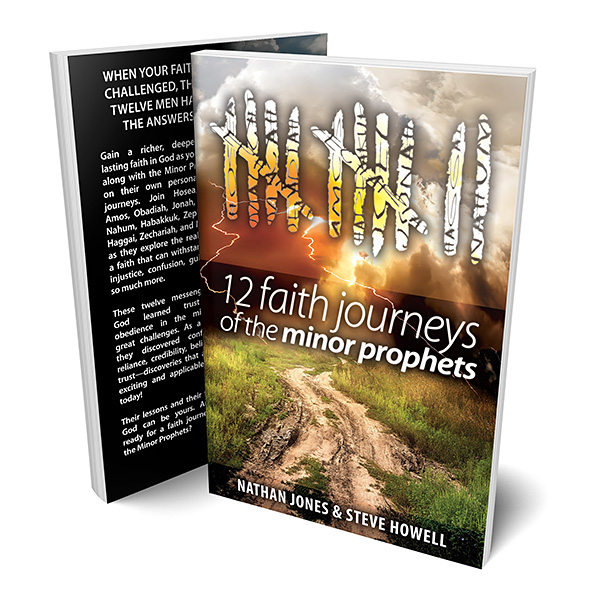Why Read the Minor Prophets?
God’s Messengers of Faith

Outside my upstairs office stands a tiny, three–foot tall door. It’s not this little, rarely used entrance to a dusty attic that really catches my eye, but the laminated paper sign pinned to the top of its frame. It simply reads: “Minor Prophets.”
This strange sign is likely the result of someone’s wry wit, but to me it speaks volumes about how people perceive the 12 books of the Bible labeled just like that sign — the Minor Prophets. Minor. Strange. Little. Unimportant. Unused. Dusty. These are all words so many people of the Christian faith think of when they encounter these Old Testament writings.
Excuses, Excuses
The excuses for skipping these books are plentiful. For starters, the Minor Prophets’ writings are short, merely a brief few chapters or just a chapter, hence the designation “minor.” The Old Testament is comprised of thirty–nine books, but the combined 12 books of the Minor Prophets comprise less than 7% of the entire Old Testament. Because of their short length, these books are often deemed of little value, and so are easily overlooked.
Then there’s the fact of popularity. They are “fringe” by almost any definition of the word, trapped on the outskirts of the Old Testament and written by a dozen guys who would be considered by today’s standards strange and unpopular.
Sure, since grade school we’ve all learned about the runaway Jonah who was swallowed by a “whale.” But, other than Jonah, who has heard of these other oddly named men: Hosea, Joel, Amos, Obadiah, Micah, Nahum, Habakkuk, Zephaniah, Haggai, Zechariah and Malachi? Try even pronouncing Habakkuk! And so, because we believe we cannot possibly feel any connection to such “fringe” men, their names are never spoken from our pulpits.
In addition, while other well–known Bible heroes have compelling stories, a number of the Minor Prophets seem to have missed the memo when it comes to personal narrative. With the exception of a few brief examples, the Minor Prophets can seem like faceless mouthpieces for God, not interesting individuals in their own right.
Role of the Prophets
To better appreciate these spokesmen and their impact, let’s start by understanding their role. At certain periods of time, Yahweh God made clear both His intentions and plans through the work of individuals He called in the Hebrew, nabi, which we today call prophets.
While that job title currently causes most people to think about telling the future, a prophet’s main role wasn’t prediction. Prophets were simply individuals who would receive and then declare God’s messages. These twelve authors were, as the Apostle Peter explained, “holy men of God [who] spoke as they were moved by the Holy Spirit” (2 Peter 1:21).
In the prophetic books, we best find God’s motivations for the actions He takes involving justice, as well as His nature of compassion and forgiveness. As God is speaking through these men, we are granted a breathtaking, bay window–sized view into our Heavenly Father’s heart.
Yahweh called the prophets to share important messages because He cares about His people. There were messages for the nations of Judah, Israel, and the surrounding nations of their time. They contained dire warnings of coming judgment for their moral failings and emphatic calls to repentance.
God even pointed out events that would occur in the far distant future, such as the coming of the Messiah and the events of the end times. Each message was delivered through the filter of the prophet’s language, style and situation, but all of the messages poured forth God’s heart.
Prophets of Faith
When one truly digs into the lives of the Minor Prophets, one will discover not something minor, strange, little, unimportant, unusable and dusty, but the real–life stories of 12 men who were thrust into quite perilous situations. You will discover that these guys were everyday people just like so many of us. They hailed from diverse backgrounds such as farmers and construction workers, some clergy and a few aristocrats — and a mix of ages from teen up to senior citizens.
What tied them all together was a specific call by God to wear the burdensome mantle of prophet and deliver His messages. And what messages they were! So full of fire from the pain of betrayal to the joy of fatherly love that their ears must have burned upon hearing them.
Those impassioned messages revolved like the planets around the sun, all around one key subject — faith. Faith is that strong or unshakable belief in something, especially with little or no proof of evidence. The Bible itself defines faith simply as “the substance of things hoped for, the evidence of things not seen” (Hebrews 11:1).
Confidence. Reliance. Credence. Belief. Trust. We could all use some of that in our relationships with God. And so, too, did the Minor Prophets. The Minor Prophets needed a healthy dose of faith in God, for despite their position of honor in being chosen to relay the Lord’s oracles, these messengers were often treated quite badly by the very people God had sent them to. Because of this treatment, the prophets gained a unique perspective into the challenges surrounding faith, and that makes them highly relevant to us today.
Resource
To order, call 1-972-736-3567, or select the resource below to order online.



